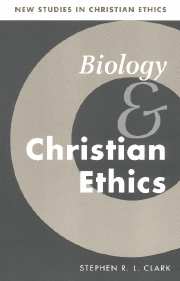Book contents
- Frontmatter
- Contents
- General editor's preface
- Preface
- Introduction
- 1 The development of Darwinian theory
- 2 Moral and metaphysical assumptions
- 3 Trying to live in nature
- 4 The biology of sin
- 5 Human identities
- 6 The goals of goodness
- 7 The end of humanity
- 8 The covenant with all living creatures
- 9 Conclusion: cosmos and beyond
- Index
5 - Human identities
Published online by Cambridge University Press: 02 December 2009
- Frontmatter
- Contents
- General editor's preface
- Preface
- Introduction
- 1 The development of Darwinian theory
- 2 Moral and metaphysical assumptions
- 3 Trying to live in nature
- 4 The biology of sin
- 5 Human identities
- 6 The goals of goodness
- 7 The end of humanity
- 8 The covenant with all living creatures
- 9 Conclusion: cosmos and beyond
- Index
Summary
NATURAL KINDS
Scientific racists in the nineteenth century convinced themselves that ‘Africans’ must be of a different species, whatever the Bible or tradition or experience said. They claimed for themselves and for their ‘science’ the right to ignore traditional opinion on this matter. No doubt their error, or their sin, was similar to that made by consciously ‘biblical’ theorists who supposed that the fable about Ham's descendants somehow justified Negro slavery. The habit of inferring ‘facts’ from ‘values’ is usually blamed for this. Instead of trying to find out what is truly the case, we are inclined to insist on what must be the case, on the basis of our beliefs in what should be. Negroes, they thought, really should be slaves (whereas all men were created equal), and they must therefore insist that either Negroes were not quite men, or that the gift made at our creation had been withdrawn from some of us. But the fallacy is also committed by those on the other side. The body of social scientists and biologists who were called, in 1949, to lend their authority to UNESCO's moral and political ideals, declared firmly that ‘man-kind is one: all men [i.e. all humans] belong to the same species’. They were probably correct: our present evidence suggests, indeed, that we are a homogeneous species, perhaps because our common ancestry was not so long ago. But it may reasonably be doubted that any serious efforts had been made to discover if all sub-varieties of humankind are interfertile.
- Type
- Chapter
- Information
- Biology and Christian Ethics , pp. 187 - 240Publisher: Cambridge University PressPrint publication year: 2000



